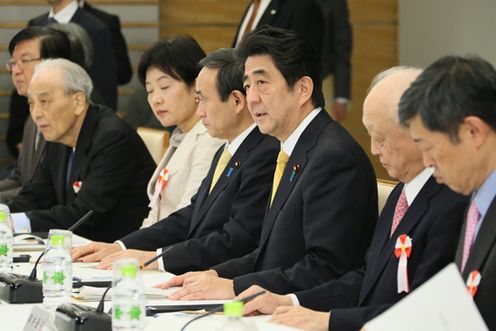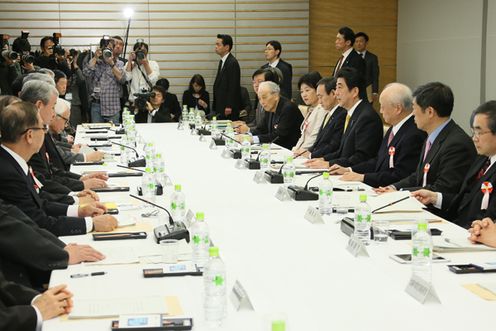Home > News > The Prime Minister in Action > December 2013 > Meeting of the Advisory Panel on Reconstruction of the Legal Basis for Security
Meeting of the Advisory Panel on Reconstruction of the Legal Basis for Security
Tuesday, December 17, 2013

Photograph of the Prime Minister delivering an address (1)

Photograph of the Prime Minister delivering an address (2)
Prime Minister Shinzo Abe held the fifth meeting of the Advisory Panel on Reconstruction of the Legal Basis for Security at the Prime Minister's Office.
During the meeting, members of the Panel had an exchange of views.
The Prime Minister said in his opening address,
"I would like to express my appreciation to the distinguished members who have gathered here during your busy schedules. Today, the Cabinet decided on Japan's first-ever National Security Strategy ("the Strategy"). The reconstruction of the legal basis for security that this panel is tasked with will support the implementation of the Strategy.
In the previous meeting, we focused our discussions on the right of collective self-defense. As I noted in the previous meeting, then Prime Minister Yoshida stated in the new constitutional assembly in 1946 that Japan had 'renounced both the right to war and the right of belligerence as a means of exercising the right of self-defense.' However, the collective security arrangement of the United Nations did not function as had been anticipated. Subsequently, the Korea War broke out in 1950, Japan gained its independence in 1952, and the Self-Defense Forces were established in 1954. Around this time, the Government of Japan stated in the Diet that, 'Japan has not renounced the right to fight for self-defense. It would not constitute a breach of the Constitution to use force as a means of defending its territories if an armed attack occurs against the nation.'
In addition, in the case of the so-called "Sunagawa Incident" of 1959, the Supreme Court of Japan issued a ruling that stated that Article 9 of the Constitution does not in any way deny the right to self-defense, while referring to the right to live in peace in the preamble of the Constitution.
Subsequently, and as can be seen in documents that were submitted to the Diet in 1972, for example, the Government came to adopt a position that the Constitution cannot in any way be interpreted as prohibiting self-defense measures that are necessary to maintain the peace and security of Japan and to ensure its survival.
Today, military technologies are rapidly advancing, and surrounded by powerful military nations, the security environment of Japan is increasing in severity. Under such circumstances, can Japan truly fulfill its duty as a nation to protect the lives of its people and its survival with the right of individual self-defense alone? In an era where ballistic missiles and other threats could cross national borders easily and swiftly reach Japan, could we truly determine that the right of collective self-defense, where we protect each other with other nations, is not necessary?
Today, I would like the members to discuss the collective security of the United Nations, the concept of "ittaika"* and the use of weapons in peacekeeping operations (PKO) and other situations.
Since Japan became a member of the United Nations in 1956, the Government of Japan has consistently upheld the cooperation with the United Nations as one of the pillars of its national security policy, together with the development of its defense program and the strengthening of the Japan-U.S. alliance. Is it acceptable that Japan, as a country that enshrines the principles of international cooperation in the preamble of the Constitution and upholds its duty to observe international order as mentioned in Article 98, adopt a passive stance to participation in collective security measures of the United Nations?
Moreover, with regard to logistical support, a field in which Japan can demonstrate its strengths, we have been restrained in providing such support based on its unique ideas to date. Currently, approximately 400 Self-Defense Force personnel are dispatched to PKO missions, a number that ranks no more than between 40th and 50th in the world. However, under the Constitution, in which the preamble enshrines the principles of international cooperation, should we not play a more active role in supporting the international order jointly with other nations?
Today, it is from these perspectives that I would like the members to engage in frank and open discussions on interpretations of the Constitution that are appropriate for a new era."
* "According to the hitherto held constitutional interpretation, even though Japanese logistic support, including supply, transportation and medical services, is not in itself 'use of force,' such support should be deemed as 'use of force' prohibited under the Constitution if it is provided in such a manner that forms an 'integral part' of the use of force by a third country. This concept is called 'ittaika' with the use of force in the current interpretation of the Constitution." (The 2008 Report of the Advisory Panel on Reconstruction of the Legal Basis for Security. June 24, 2008. Page 4.)

